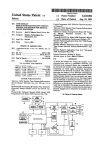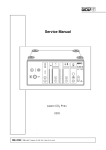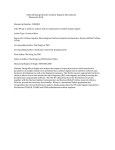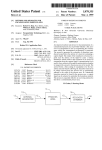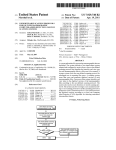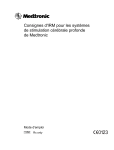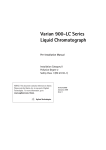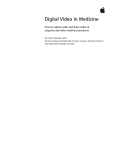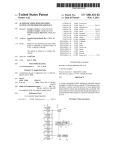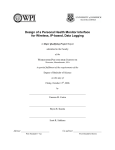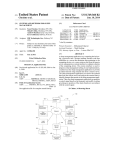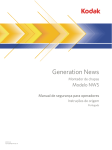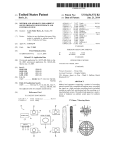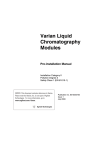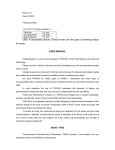Download Medical apparatus remote control and method
Transcript
US 20040235446A1
(19) United States
(12) Patent Application Publication (10) Pub. No.: US 2004/0235446 A1
(43) Pub. Date:
Flaherty et al.
(54)
MEDICAL APPARATUS REMOTE CONTROL
AND METHOD
(76) Inventors: J. Christopher Flaherty, Tops?eld,
Nov. 25, 2004
Publication Classi?cation
(51)
Int. c1.7 ........................... .. G08C 19/12; H04B 1/06
(52)
US. Cl. .......................................... .. 455/352; 341/178
MA (US); John T. Garibotto,
CharlestoWn, MA (US)
Correspondence Address:
(57)
ABSTRACT
R. Anthony Diehl, Esq.
Insulet Corporation
100 Cummings Center, Suite 239G
Beverly, MA 01915 (US)
(21) Appl. No.:
(22)
Filed:
10/866,837
Jun. 14, 2004
Related US. Application Data
A system for providing medical treatment to a patient,
including a medical treatment apparatus and a remote con
trol device. The medical treatment apparatus has a local
processor, and a local communication element connected to
the local processor, While the remote control device includes
a remote processor, user interface components connected to
the remote processor, and a remote communication element
connected to the remote processor and adapted to commu
nicate With the local communication element of the medical
(63)
Continuation of application No. 10/032,167, ?led on
Dec. 21, 2001, noW Pat. No. 6,768,425.
treatment apparatus in a Wireless manner such that informa
tion can be transferred betWeen the local processor and the
remote processor. The remote control device also includes at
(60)
Provisional application No. 60/257,756, ?led on Dec.
least tWo separate poWer supplies connected to the remote
processor.
21, 2000.
100
110--
120--—
Patent Application Publication Nov. 25, 2004 Sheet 1 0f 7
100
A
K
I'll
US 2004/0235446 A1
130
l
'
110~f~
~1o2
120”“0 o o o
o o o o
o o o o
FIG. 1
10105 v,__TEXT ON DISPLAY
1002
Patent Application Publication Nov. 25, 2004 Sheet 2 0f 7
10oK
US 2004/0235446 A1
2/7 i, a
(140 i (1 70
gig
I||
(15o
~102
120~/
100
K
(120
(110
I
102“
v1 50
‘08”
. 171mm
=
1
16O1)O7)L1O6 L105 (101
10
FIG. 2A
i
D
32
72
FIG. 2B
Patent Application Publication Nov. 25, 2004 Sheet 3 0f 7
100
US 2004/0235446 A1
K
102?
\
:
\
_
\ 108Aw
‘
“Fla 1088
(120
K110
I
I
rt}
“.150
t
I
(160
, HTH
(106
(105
}
K01
Q
\\\\\\\\\\\\\\\\\\\\\\\\\\\\\\\\\t
FIG. 3
10K
Patent Application Publication Nov. 25, 2004 Sheet 4 0f 7
US 2004/0235446 A1
VOLTAGE *
VT1
VT2
TIME
FIG. 4
Patent Application Publication Nov. 25, 2004 Sheet 5 0f 7
US 2004/0235446 A1
102
171
FIG. 5
100
K
g1 02
I/
‘1 1 OTS
I
108
l
I/
160))
105)
106
107
FIG. 5A
L101
471
Patent Application Publication Nov. 25, 2004 Sheet 6 0f 7
US 2004/0235446 A1
10>
,-
_
_
_\
_
_
_
—
—
_
_
—
/
_
_
\ \ ~~352
'
'
|
|
'\
|
|
\
_
_
_
_
_
V
_
mmun
_
/
/
L26
1007\
110-/~
_
250
12o“ o o o 0
K
O O O O
O O O 0
FIG. 6A
FIG. 6B
Patent Application Publication Nov. 25, 2004 Sheet 7 0f 7
US 2004/0235446 A1
£10
110
INITIAL
CONTACT I'D -
—>
RCID FDDID
120
32
72
70
FIG. 7
100K
{10
110-»
oo_o-
O O .n O 0 0
FICID FDDID
CODED
TRANSMISSION
32
70
FIG. 7A
{10
RCID FDDID
CODED
<—
TRANSMISSION
32
72
70
FIG. 7B
Nov. 25, 2004
US 2004/0235446 A1
MEDICAL APPARATUS REMOTE CONTROL AND
METHOD
CROSS-REFERENCE TO RELATED
APPLICATIONS
[0001] The present application claims priority to provi
sional US. patent application serial No. 60/257,756, ?led on
Dec. 21, 2000, Which is assigned to the assignee of the
present application and incorporated herein by reference.
visions, VCRs, and other home audiovisual equipment
remote control devices. In US. Pat. No. 4,855,746, for
eXample, Stacy shoWs a multi-device remote control With an
array of keys that are eXposed in pre-selected groups by
moving a slidable cover. A position of the slidable cover
determines Which device the remote control device Will
control and the type of coded control signals that the remote
control device Will transmit. Other eXamples of devices
having multiple functions include some recent cellular tele
phones, Which have been manufactured With personal com
The present application is related to US. patent application
Ser. No. 09/943,992, ?led on Aug. 31, 2001, Which is
assigned to the assignee of the present application and
puter functions, electronic address and calendar functions,
incorporated herein by reference.
[0007]
and built-in internet access.
User controlled ambulatory infusion devices can be
an ideal use for a remote control. Ambulatory infusion
FIELD OF THE INVENTION
pumps have been developed for delivering liquid medica
ments to a patient. These infusion devices have the ability to
[0002] The present invention relates generally to handheld
devices that perform multiple functions, and more particu
larly to a handheld device for remotely controlling one or
more medical apparatuses in addition to performing other
functions for a user.
BACKGROUND OF THE INVENTION
[0003] Today, there are various handheld electronic
devices that are routinely carried by a large portion of the
population on a daily basis. Examples of these devices
include cellular telephones such as those offered by Nokia or
Motorola, personal digital assistants (PDA’s) such as those
offered by Palm, Inc., handheld electronic games such as the
Lunker Bass Fishing game by Radica, garage door openers,
and various other handheld electronic devices that perform
speci?c functions for a user. In recent years, technological
advances have alloWed signi?cant enhancements in such
handheld electronic devices including reduced siZe and
offer sophisticated ?uid delivery pro?les accomplishing
bolus requirements, continuous infusion and variable ?oW
rate delivery, Which can result in better efficacy of the drug
and therapy and less toXicity to a patient’s system. An
eXample of a use of an ambulatory infusion pump is for
continuous subcutaneous infusion of insulin to diabetic
patients. Many diabetics require insulin intake to treat their
disease, and continuous subcutaneous infusion of insulin
from an infusion pump has been shoWn in numerous studies
to greatly improve the immediate and long term health
conditions of those patients. These pumps can deliver insulin
on a continuous basal basis as Well as a bolus basis as shoWn,
for eXample, in US. Pat. No. 4,498,843 to Schneider et al.
[0008]
User controlled ambulatory infusion devices are an
ideal use for a remote control since the infusion devices may
be located out of reach of a patient, or may be discreetly
located beneath clothing or in a carrying pouch. Since the
Weight, longer battery life, simpli?ed user interfaces, and
diabetic patient utiliZing an ambulatory infusion pump may
Wish to place the device beneath their clothing, for added
other additional neW features and improvements. For
eXample, the addition of a touch screen panel, such as that
comfort and or for privacy, a remote control device is
incorporated into the Palm Pilot personal digital assistant,
infusion pump, or simply to revieW pump status or other
alloWs simple menu driven access to personal calendars,
address books, to-do lists and email.
pump information. These patients may also carry a glucose
[0004] Other handheld electronic devices include remote
control devices such as those commonly supplied With
televisions, video cassette recorders (VCR’s), and DVD
players. Using Wireless communication, such as radio fre
phone, pager, PDA or other handheld electronic device not
directly associates With the treatment of their health condi
quency, infrared or ultrasound, these remote control devices
alloW a user to control separate electronic equipment With
out having to be in proximity to or otherWise have access to
appropriate to adjust various parameters associated With the
measuring device such as a glucometer as Well as a cellular
tion. Ambulating With multiple handheld devices such as
these can be fraught With issues not the least of Which is
confusion, and the increased probability of losing one of the
devices.
[0009]
Certain ambulatory infusion devices may be
the controls of the separate electronic equipment.
designed to be of limited life or even disposable. For
[0005] Various medical apparatus can be controlled With a
remote control device as Well. EXamples of these devices
example, US. patent application Ser. No. 09/943,992, ?led
on Aug. 31, 2001, Which is assigned to the assignee of the
include X-ray machines, operating tables, diagnostic moni
present application and incorporated herein by reference
tors, and drug infusion devices. The medical apparatus
remote control devices provide similar advantages to tele
discloses a remotely controlled, disposable infusion pump.
vision or VCR remote control devices, obviating the need
In such cases, it Would be desirable to provided a non
disposable remote control device that can be used to control
for a user to be proXimal to or have access to the controls of
successive disposable pumps.
the medical apparatus.
[0010]
If a handheld electronic device is to be used for
[0006] As handheld electronic devices and remote control
devices have become Widespread in their use, it has become
desirable to combine multiple products or functions into
certain prioritiZation of performance may be desired. One
such prioritiZation, for eXample, relates to poWer consump
single devices. Such devices having multiple functions do
eXist, but usually the particular grouping of functions are
tion. As most of today’s handheld devices are poWered by a
replaceable or rechargeable battery, it may be desirable to
related, such as the “universal remotes” available for tele
regulate poWer consumption and loW battery conditions in a
controlling a medical apparatus, such as an infusion pump,
Nov. 25, 2004
US 2004/0235446 A1
specialized manner. In US. Pat. No. 4,514,732, for example,
Hayes shows power conservation methods for particular
commands of a remote control for electronic audiovisual
equipment. When a user continually presses a key on the
remote control, such as to decrease volume, the remote
control is programmed to send a single command signal to
the equipment to start decreasing volume When the user
initially presses the button, and to send a single command
signal to stop decreasing volume When the button is
released. Hayes’ method avoids sending a continuous stream
of signals to dictate the volume decrease in the equipment,
thus reducing the poWer consumption of the remote control.
[0011] Some electronic handheld devices and remote con
trols include loW battery Warnings via an audible alert,
screen message or other visual loW battery indicator. Often,
these devices are used until the batteries contain insuf?cient
energy to poWer the device at Which time the batteries are
replaced or recharged. HoWever, for controlling medical
treatment apparatus, such doWn time due to lack of neW
batteries could be very undesirable.
[0012]
Accordingly, there continues to be a need for
remote control devices Which can be used With medical
treatment apparatus, such as disposable infusion pumps, as
Well as other functions. The additional functions may be
related to the therapy or medical treatment apparatus itself,
such as a blood glucose measuring function for the diabetic
patient controlling an ambulatory insulin pump. The addi
tional functions may be unrelated, such as PDA, cellular
telephone, or game functions. Desired remote control
devices, therefore, Will obviate the need for a user to carry
multiple handheld devices. Preferably, the remote control
devices Will include poWer consumption regulations that
prioritiZe poWer delivery for the medical controlling func
tions of the devices. In addition, the remote control devices
Will preferably include battery monitoring Which substan
tially avoids a total loss of poWer for the medical controlling
function. Moreover, such remote control devices Will be
adapted for use With multiple medical treatment apparatus,
such as successive disposable infusion pumps.
SUMMARY OF THE INVENTION
[0013]
In response, the present invention provides a
BRIEF DESCRIPTION OF THE DRAWINGS
[0015]
FIG. 1 is a perspective vieW of an exemplary
embodiment of a remote control device constructed in
accordance With the present invention;
[0016]
FIG. 1a is a perspective vieW of an exemplary
embodiment of a medical treatment apparatus constructed in
accordance With the present invention;
[0017]
FIG. 2 is a perspective vieW of another exemplary
embodiment of a remote control device constructed in
accordance With the present invention;
[0018] FIG. 2a is a section vieW of the remote control
device of FIG. 2 taken along line a-a of FIG. 2;
[0019] FIG. 2b is a perspective of an exemplary embodi
ment of ambulatory infusion device constructed in accor
dance With the present invention;
[0020] FIG. 3 is a sectional side vieW of another exem
plary embodiment of a remote control device constructed in
accordance With the present invention;
[0021] FIG. 3a is a sectional side vieW of another exem
plary embodiment of an ambulatory infusion device con
structed in accordance With the present invention;
[0022] FIG. 4 is a chart illustrating voltage decay over a
period of time and loW battery level thresholds for a remote
control device constructed in accordance With the present
invention;
[0023]
FIG. 5 is a top plan vieW of a further exemplary
embodiment of a remote control device constructed in
accordance With the present invention;
[0024] FIG. 5a is a sectional vieW of the remote control
device of FIG. 5 taken along line a-a of FIG. 5;
[0025]
FIG. 6 is a top plan vieW of a packaged assembly
of a medical treatment apparatus assembled in accordance
With the present invention;
[0026]
FIG. 6a is a top vieW of a remote control device of
the packaged assembly of FIG. 6;
[0027]
FIG. 6b is a top vieW of a vial of liquid medication
remote control for a medical treatment apparatus that
includes functions in addition to control of the medical
of the packaged assembly of FIG. 6; and
apparatus, as desired. According to one exemplary aspect,
the multi function medical apparatus remote control device
[0028]
includes poWer consumption regulations that prioritiZe
poWer delivery for the medical controlling functions of the
devices. According to another exemplary aspect, the multi
function medical apparatus remote control device includes
FIGS. 7, 7a and 7b are perspective vieWs illustrat
ing an exemplary embodiment of a method of Wireless
communication according to the present invention con
ducted betWeen a remote control device and a ?uid delivery
device of the present invention.
[0029]
Like reference characters designate identical or
battery monitoring Which substantially avoids a total loss of
corresponding components and units throughout the several
poWer for the medical controlling function. According to an
vieWs.
additional exemplary aspect, the multi function medical
apparatus remote control device adapted for simultaneously
or serial use With multiple medical treatment apparatus, such
as successive disposable infusion pumps. Also provided as
an aspect of the present invention are methods for assuring
proper communication betWeen a remote control device a
speci?c device to be controlled.
[0014] These aspects of the invention together With addi
tional features and advantages thereof may best be under
stood by reference to the folloWing detailed descriptions and
examples taken in connection With the accompanying illus
trated draWings.
DETAILED DESCRIPTION OF EXEMPLARY
EMBODIMENTS
[0030] Set forth hereinbeloW are detailed descriptions of
possible embodiments and examples of multi function
remote control devices, medical treatment apparatus, and
systems, kits and methods according to the present inven
tion.
[0031] Referring ?rst to FIG. 1, there is illustrated, gen
erally at 100, an exemplary embodiment of a multi function
remote control device constructed in accordance With the
Nov. 25, 2004
US 2004/0235446 A1
visual display 110, such as a liquid crystal display or LCD,
that is mounted to a housing 102. Preferably, the display 110
electrocardiogram monitoring, such as an external infusion
pump, an implanted infusion pump, a pacemaker, an cardiac
de?brillator, an neurostimulator, an x-ray machine, an EKG
is a touch screen display such as that included in touch
machine, blood sampling, blood analysis, a diagnostic
screen monitors found in various equipment including the
device, a glucometer, blood analyZing equipment, an elec
trocautery device, an operating room table, a visual monitor,
a laparoscopic device, and other medical equipment and
present invention. The remote control device 100 includes a
Palm Pilot® personal digital assistant manufactured by Palm
Inc. of Santa Clara Calif. Mounted to the housing 102 are
electromechanical sWitches, such as a membrane keypad
120, to alloW the user to input data or activate commands.
The remote control device 100 also includes means of
transmitting electronic signals including antenna 130 Which
is shoWn external to the housing 102 but is preferably
contained Within the outer surface of the housing 102.
Examples of the internal electronics and other components
of the device 100 are described in detail in subsequent
sections. The Wireless communication is accomplished
using one or more forms of electronic information transfer
including radio frequency, infrared or ultrasound communi
cations, or other forms of non-Wired electronic information
transfer. The device receiving the communications Would
include a receiving antenna, and electronics to interpret and
otherWise transform the communicated data to a useful
form, such as that described in subsequent ?gures and
embodiments found herebeloW.
[0032] FIG. 1a depicts an example of a medical treatment
apparatus 1000 of the present invention. The example is a
electrocardiogram device 1000 With multiple displays, a ?rst
medical treatment apparatus display 1010A and a second
medical treatment apparatus display 1010B. The ?rst display
1010A is shoWn With Waveforms produced by various EKG
leads attached to a patient’s skin (not shoWn) that make up
a typical electrocardiogram of a heart patient With an inferior
myocardial infarction. Other examples of medical treatment
apparatus that can be remotely controlled include one or
more of the folloWing: external infusion pump, implanted
infusion pump, pacemaker, cardiac de?brillator, neurostimu
lator, x-ray machine, EKG machine, diagnostic device,
functions.
[0035] In addition to receiving electronic Wireless com
munication via the antenna 1030, the medical treatment
apparatus 1000 may also send Wireless information back to
the remote control device 1000. The information can include
diagnostic information, history information, equipment sta
tus information, alarm status information, or other informa
tion related to the function of the device 1000. Information
can also include device speci?c information, such as serial
number, model number or a unique identifying alphanu
meric code. Information can also include con?rmation that
a previously doWnloaded transmission from the remote
control device 100 Was properly received, or even improp
erly received, thereby triggering the remote control device
100 to repeat the previous transmission of electronic data.
[0036]
Each transmission of electronic data betWeen the
device 100 and the apparatus 1000 can include an identi?
cation representing the remote control device 100, the medi
cal treatment apparatus 1000, or both. The unique identi?
cations, Which can include codes, are placed in the electronic
memory of either the remote control device 100 or the
medical treatment apparatus 1000 during their manufactur
ing process. After an initial communication betWeen the
device 100 and the apparatus 1000, either or both of the
unique identi?cations can be transferred betWeen the device
and the apparatus, and all subsequent communications can
include either or both of the unique identi?cations. In
addition, prior to acting upon commands received from the
glucometer, blood analyZing equipment, electrocautery
remote control device 100, a check of proper identi?cation
devices, operating room tables, visual monitors and laparo
scopic remote control devices.
communicating With the Wrong medical treatment apparatus
can eliminate the issue of a remote control device 100
1000, and vice versa.
[0033] The medical treatment apparatus includes a hous
ing 1002 on Which is mounted various controls including
electromechanical sWitches 1020. Also depicted in FIG. 1a
is an integrated antenna 1030, shoWn exposed but preferably
contained Within the device 1000. The antenna 1030
receives signals from the remote control device 100 of FIG.
1 so that a user can adjust various parameters, request
information, or otherWise command, control or communi
cate With the medical treatment apparatus 1000. In this
embodiment, the parameters to be adjusted can include
selection of a particular EKG lead to be displayed, adjust
ment of the display scale, or other parameters of the device
1000, for example. This remote control capability may be of
great advantage When the device 1000 is close to an active
x-ray, contained in the sterile ?eld of a medical procedure,
or contained in other biologically haZardous ?elds, for
example.
[0034] The medical treatment apparatus 1000 includes
internal electronics (not shoWn) to take the information
received via the antenna 1030, interpret the data in electronic
form, and adjust programming or other parameters accord
ingly. The remotely controllable apparatus 1000 can com
prise medical devices and/or perform functions other than
[0037]
A start up or initial communication mode, there
fore, is preferably conducted betWeen the device 100 and the
apparatus 1000 Wherein either or both of the unique iden
ti?cations is exchanged, folloWed by memory storage of
either or both unique identi?cations. In addition, all subse
quent communications preferably include a con?rmation of
the proper identi?cation prior to acceptance of instructions.
In some instances, the remote control device 100 may
doWnload a uniquely assigned identi?cation to the medical
treatment apparatus 1000, Which is then stored in the elec
tronic memory of the medical treatment apparatus 1000 to
establish a unique identi?cation for that device. Examples of
identi?cation assignment, transfer, and con?rmation are
described in more detail in subsequent exemplary embodi
ments of the present invention.
[0038] It should be understood that the remote control
device 100 may include softWare and electronic hardWare
for performing other functions, such that the remote control
device 100 is a “multi-function” device. Other functions can
include that of a personal digital assistant, such as the Palm
Pilot®. Alternatively, the other functions of the remote
control device 100 can include one or more of an electronic
Nov. 25, 2004
US 2004/0235446 A1
game, a barcode reader, a television or VCR remote, or a
preferably is an audio alarm such as a pieZo buZZer, com
cellular telephone, for example. Many other functions are
mercially available from Star Micronics Company, Ltd. of
Edison, N]. The alarm 106 is activated by the electronics
possible.
[0039]
FIGS. 2 and 2a shoW another possible embodi
ment of a remote control device 100 according to the present
invention. The remote control device is similar to the remote
control device of FIG. 1 such that similar elements have the
same reference numerals. Internal components of the remote
control device 100 are contained Within a housing 102 and
include a communication element 160 (referred to in
appended claims as “remote” communication element)
Which is used to send Wireless communication to the medi
cal treatment apparatus 1000. The Wireless communication
may consist of electronic packets of information sent by
radio frequency, infrared, ultrasound or other Wireless forms
of communication. Also included is a poWer supply 108,
Which can be integral to the device and rechargeable by
attaching to a standard AC poWer converter. Alternatively,
the poWer supply 108 may consist of standard battery
technology such as nickel cadmium, alkaline, silver oxide or
other batteries available at convenience and other stores, and
be replaceable.
[0040] Within the housing 102 is an electronic printed
circuit board 101 having electronics 105 that includes
memory 107, Which is shoWn as a separate electronic
module but preferably is integral With the electronics 205.
The electronics 105 also includes a microprocessor or other
programmable and logic circuitry to perform programmable
functions (referred to in the appended claims as “remote”
processor). Other components of the electronics 105 can
include digital circuitry, analog circuitry, resistors, capaci
tors, transistors, integrated circuits, ampli?ers, additional
microprocessors, logic circuitry, integrated circuits, pro
grammable logic, analog to digital converters, digital to
analog converters, multiplexors, and other semiconductor
circuitry.
[0041] Preferably, a microprocessor and associated cir
cuitry is embedded into the electronics 105 and receives
programming signals from a membrane keypad 120, con
trols the visual display 110, and creates electronic command
signals and identi?ers to be broadcast in Wireless form via
the communication element 160. Embedded in the memory
107 of the electronics 105 or included in the microprocessor
is one or more microprocessor based softWare programs that
de?ne, control and facilitate the operation of the device 100
in a predetermined manner.
105 When an alert or alarm condition is encountered during
operation of the remote control device 100. Alarms may be
predicated by a condition in the remote control device 100
or an alarm condition detected in the medical treatment
apparatus 1000 that has been uploaded into the remote
control device 100. Examples of alarm conditions include
detection of a malfunction, loW battery conditions, or even
an alarm clock function. Examples of alarm conditions
uploaded from the medical treatment apparatus 1000 include
loW battery conditions, detection of malfunction, empty
reservoir in a ?uid delivery device, occlusion of How in a
?uid delivery device, out of paper condition, or out of
communication range.
[0044] The communication element 160 is also shoWn
mounted to the printed circuit board 101 and is electroni
cally attached to the electronics 105 to feed the electronic
signals, or packets of information, to and possibly from the
communication element 160. Also electrically connected to
the printed circuit board 101 and the electronics 105 thereon
is the user interface components 110, 120.
[0045]
In one exemplary embodiment, a medical treatment
apparatus of the present invention comprises an ambulatory
?uid delivery device 10, as shoWn in FIG. 2b. The ?uid
delivery device 10 is for the infusion of insulin for diabetic
patients, and an additional function of the remote control
device 100 is a glucose measurement device, or glucometer
function. In such an embodiment, the remote control device
100 includes the necessary hardWare to measure blood
glucose, such as that taken from a blood sample, so that a
diabetic patient can avoid the need to carry multiple hand
held devices (i.e., one for controlling the ?uid delivery
device and one for measuring blood glucose).
[0046] Thus, as shoWn in FIG. 2, the remote control
device 100 includes a glucometer port 150, Which can
comprise a standard Wire connector, alloWing attachment to
an existing glucometer device, or a more sophisticated input
device for measuring blood glucose utiliZing optics or
sensors for analyZing blood glucose strips or blood drops.
Non-invasive blood glucose technologies are commercially
available or in development by various manufacturers and
developers. Cygnus Corporation of RedWood City, Calif.,
for example, manufacturers the GlucoWatch Biographer
blood glucose measuring system. The glucometer port 150
[0042] Combined With the memory 107, Which can be one
or more components integrated into electronics 105, can be
can be adapted to electronically connect With a device such
?xed, preprogrammed read only memory and variable, read
information. Alternatively, the information can be commu
and Writeable memory. The memory 107 includes the pro
gramming necessary to support all functions of the device
100, including remote control of the medical treatment
nicated via Wireless technologies described herein utiliZing
apparatus as Well as the other functions such as cell phone
operation, a personal digital assistant, a glucometer diag
nostic function, a barcode reader, and an electronic game.
The memory may also be used to store clinical therapy
information, such as diabetes care guide, a troubleshooting
guide and user manual for the medical treatment apparatus
being remotely controlled, and a troubleshooting guide and
user manual for the remote control device 100.
[0043] Also included Within the housing 102 is an alarm
106 mounted to the printed circuit board 101. The alarm 106
as the GlucoWatch to transmit and receiving blood glucose
communication element 160 and a transmitting or receiving
element included in the glucometer.
[0047] Alternatively, the glucometer port 150 can be
replaced With another input, output or combination input and
output port for alloWing attachment to other devices, per
formance of electro mechanical functions such as bar code
scanning, attachment to an information upload or doWnload
device, or performance of another function. As shoWn in
FIG. 2a, the device 100 can also include a barcode reader
port 140 for connecting to a standard barcode reader pen or
gun (not shoWn) to simplify input of information such as
drug type and concentration from a drug reservoir or vial.
Nov. 25, 2004
US 2004/0235446 A1
Alternatively, the barcode reader port 140 may include the
integrated bar code reading technology and avoid the need
for another device. The device 100 also includes a computer
port 170 for connection to a personal computer or other
computer system to upload or doWnload information, as Well
as offering temporary computer control of various functions
including programming or program modi?cation of the
remote control device 100 itself. The computer port 170 can
include integrated Wireless communication technologies to
connect to a separate computer or computer netWork Without
the need for Wires or mechanical connection means.
[0048] Referring to FIG. 2b, the ?uid delivery device 10
is designed to be small and lightWeight and includes a
housing 20 and an adhesive attachment means (not shoWn)
secured to an external bottom surface of the housing for
attaching the device to the skin of a patient. Internal to the
?uid delivery device 10 are a reservoir for storing the liquid
the remote control device 100 and a unique identi?cation of
the remote control device 100 can be doWnloaded into the
?uid delivery device 10.
[0053] In a preferred embodiment, the disposable ?uid
delivery device 10 does not include a unique identi?cation,
as this may add cost to the manufacturing process. Instead,
at ?rst communication With a neW ?uid delivery device 10,
the remote control device 100 is programmed to doWnload
a unique identi?cation to the neW ?uid delivery device 10,
Which in turn is programmed to store the unique identi?ca
tion in its internal memory for the remainder of its life. All
subsequent communications betWeen the remote control
device 100 and the ?uid delivery device 10 then include the
unique identi?cation previously doWnloaded to assure
secure and proper communication betWeen the remote con
trol device 100 and the speci?c delivery device 10.
medicament, a ?uid dispenser for controlled ?uid delivery,
[0054] For example, the memory 107 of the remote con
trol device 100 automatically assigns a neW, unique identi
a communication element for receiving the Wireless com
?cation to each neW pump 10 at the initial communication,
munications from the remote control device 100, and elec
tronics for receiving the electronic communication and
controlling the function of the device. On the outer surface
of the housing 20 is included a needle insertion septum 32
to alloW ?uid to be placed into the reservoir of the ?uid
and includes the unique identi?cation in each communica
tion With the pump to prevent the pump from receiving
commands from other remote control devices that may be in
proximity With the pump 10. The initial communication and
delivery device 10 via a syringe. Alternatively, the ?uid
delivery device 10 may be pre?lled With the liquid medica
tion at a manufacturing site prior to the device 10 being
distributed to the patient or caregiver, simplifying setup and
delivery device 10 can be programmed to automatically
exchange identi?cations upon initial communications.
reducing cost by eliminating patient ?lling and obviating the
[0055]
need for needle insertion septum 32.
[0049] Exiting the housing 20 is the outlet of the ?uid path
of the device, including skin penetrating cannula 72, Which
is inserted transcutaneously, or through the skin of a patient
into the subcutaneous tissue or other transcutaneously
exchange of the unique identi?cations can be prompted by
a user, or the remote control device 100 and the ?uid
FIG. 3 depicts a cross sectional side vieW of
another possible embodiment of a remote control device 100
of the present invention. The remote control device is similar
to the remote control device of FIG. 2 such that similar
elements have the same reference numerals. The remote
delivery. Alternatively, exiting the housing 20 may be a
control device 100 of FIG. 3, hoWever, further includes
multiple poWer supplies to prevent inadvertent poWer outage
for portions of the device 100 relating to control of a medical
treatment apparatus.
standard Luer attachment such that a connection to a stan
dard transcutaneous infusion set can be made.
[0056]
accessed site, such as a vein or artery, intended for the ?uid
Removable from the housing 102 is a battery door
111, Which alloWs access to ?rst poWer supply 108A and
[0050] Preferably, the ?uid delivery device 10 is designed
second poWer supply 108B, Which can comprise replaceable
to be loW cost and have limited life such as 2 to 3 days and
batteries. Preferably, at least one of the ?rst poWer supply
108A and the second poWer supply 108B is alWays used to
poWer each function of the remote control device 100. When
thereafter be disposable. Such an inexpensive, disposable
device is possible because the device 10 does not have an
expensive, complex user interface such as electromechanical
sWitches and visual displays, since user interface is accom
plished via the remote control device 100.
[0051] The ?uid delivery device 10 may be ?lled With
insulin, and associated programming of ?uid delivery device
the energy remaining in the ?rst poWer supply 108A
(referred to in the appended claims as “general purpose
poWer supply”) decreases to a certain predetermined level or
other means of determining remaining energy life, the
second poWer supply 108B (referred to in the appended
ics. This patient population are required to take repeated
doses of insulin just to survive, and the advantages of
claims as “dedicated poWer supply”) is utiliZed for poWer.
The ?rst poWer supply 108A can continue to be depleted or
may be electrically disconnected or otherWise unused. The
second poWer supply 108B is not used to supply poWer for
each function, but a reduced number of functions including
remote control of a medical treatment apparatus. Preferably,
continuous infusion of insulin has been Well demonstrated in
scienti?c studies.
remote control function.
10 and remote control device 100 sufficient to alloW the
sophisticated ?oW pro?ling and bolus requirements for a
diabetic patient, such as insulin dependent or Type I diabet
the second poWer supply 108B provides poWer only to the
disposable infusion pump 10 described above, the remote
[0057] Determination of remaining energy level for each
poWer supply 108A, 108B can be performed by electronic
voltage detectors, electronic current detectors and integra
control device 100 may communicate With numerous infu
sion pumps 10 over a period of time. For each neW infusion
measurements of types and duration of use, a combination of
pump 10 placed into operation by a user, a unique identi?
cation of the ?uid delivery device 10 can be uploaded into
any of the aforementioned techniques along With other
energy consumption and battery level detection methods
[0052]
In the case Where the remotely controlled medical
treatment apparatus is a mass produced product, such as the
tion of values of current used, time duration measurements,
Nov. 25, 2004
US 2004/0235446 A1
known to those of skill in the art. Power supply 108A, 108B
selection based on power consumption management can be
accomplished With electronic sWitches such as transistor or
other semiconductors sWitching circuits.
[0058] It should be appreciated that the tWo poWer sup
plies 108A, 108B can provide poWer to separate speci?c
functions, or there may be particular functions that are
provided poWer by both poWer supplies. Particularly, the
function of controlling a medical treatment apparatus can be
poWered by both poWer supplies 108A, 108B, While other
functions are limited to just one of the tWo supplies 108A,
108B, for the purpose of insuring continued, non-interrupted
remote control function. In a particular embodiment, the ?rst
poWer supply 108A supplies poWer to all functions of the
device 100, and the second poWer supply 108B only supplies
poWer to the medical apparatus controlling functions and
becomes activated only When the ?rst poWer supply 108A is
depleted to a predetermined level. Each poWer supply 108A,
108B can be a battery, or other energy storage means such
as a capacitor, can be user replaceable, or can be integral to
the device and rechargeable With standard recharging means.
In one possible embodiment, the second poWer supply is
after adhesive attachment to the patient’s skin. Included at
various locations along recessed housing 200 are housing
hinged sections 23, to alloW ?exing.
[0062] Included Within the housing 200 is a reservoir 30
Which is designed and constructed to be compatible With the
liquid medication, such as insulin, to be infused. In a
preferred embodiment, the reservoir 30 is pre?lled With the
liquid medication, hoWever the entire reservoir can be
inserted by the user if in the form of a pre?lled cartridge, not
shoWn, or the ?uid delivery device 10 may include medi
cation ?ll means, such as a needle penetrable septum in ?uid
communication With the reservoir 30, also not shoWn. The
reservoir 30 is in ?uid communication With a dispenser 40,
Which is used to precisely control the amount of ?uid to eXit
the ?uid delivery device 10 via eXit port assembly 70. FIG.
3a depicts an eXit port assembly 70 including a standard
attachment such as a Luer connector 71 Which can be
attached to a transcutaneous infusion set (not shoWn) for
transcutaneous delivery of the liquid medication. Alterna
tively, the Luer connector 71 can be replaced With a trans
cutaneous cannula assembly that is integrated into eXit port
assembly 70 and obviates the need for the transcutaneous
provided as a capacitor or battery that is not user replace
infusion set.
able, is enclosed Within the housing 102, and is not acces
sible via removal of a battery door.
[0063] The dispenser 40 controls ?uid ?oW from the
reservoir 30 to the eXit port assembly 70, and can comprise
[0059] In any event, the dual poWer supply con?guration
pressuriZed. Alternatively, the dispenser 40 can comprise an
alloWs the remote control device 100 to prioritiZe providing
poWer to support the remote control of a medical apparatus
versus other user supportive functions, such as a cellular
phone function. Since it may be greatly preferred to alloW
doWn time With the cellular function versus any doWn time
With the control of the medical treatment apparatus, the dual
poWer supply control functions described herein avoid a user
inadvertently or accidentally depleting a battery supply
using a function such as a phone call and then being unable
to control their medical apparatus.
[0060]
It is a great advantage for the user to be able to
combine a remote control of a medical apparatus With other
functions such as cellular phones, personal digital assistant,
or other handheld electronic device. HoWever, if use of the
non-medical function depletes the battery to a loW enough
level to prevent control of the medical apparatus, the multi
function device may lose its appeal. The poWer supply
control circuitry described herein, therefore, prevents non
medical usage of remote control device 100 that Would
deplete the batteries to a point of loss of the medical
apparatus remote control function.
[0061] FIG. 3a shoWs a ?uid delivery 10 to be remotely
controlled by a remote control device 100 of the present
invention. The ?uid delivery device of FIG. 3a is similar to
the ?uid delivery device of FIG. 2b. The ?uid delivery
device 10 includes recessed housing 200 Which includes a
recessed surface 29 positioned Within a continuous ring
adhesive layer 201. Located beneath housing adhesive layer
201 may be secondary housing adhesive layer 202 such that
if the housing adhesive layer 201 loses suf?cient adhesive
properties and is removed, the secondary adhesive layer 202
is available to attach, or reattach, the ?uid delivery device 10
to skin of a patient. Preferably, the siZe of the ?uid delivery
device 10 is small to alloW comfortable adhesive attachment
to the patient’s skin. Based on the siZe and shape of recessed
housing 200 it may be desirable for the outer shell to ?eX
a linear or rotary peristaltic pump if the reservoir 30 is not
electrodynamic pump, a displacement pump or other ?uid
pumping mechanism. The dispenser 40 can be combined
With a separate metering element to achieve the proper
volume of ?uid to be infused, or the dispenser 40 can be
adapted to independently infuse the correct volumes.
[0064] If the reservoir 30 is pressuriZed, by a compressing
member or by being enclosed in a gas pressuriZed chamber
for eXample, the dispenser 40 can be adapted to simply
meter the ?uid from the reservoir. The dispenser 40 can then
include an accumulator chamber and valves before and after
the accumulator chamber to dispense ?Xed pulses of ?uid.
Alternatively, the dispenser 40 can be adapted to control
How rate via ori?ce constriction and expansion.
[0065] Still referring to FIG. 3a, an electronic microcon
troller 50 (referred to in the appended claims as a “local”
processor) is used to electronically control the dispenser 40.
The dispenser 40 can include electrically driven propulsion
means, electrically activated remote control devices such as
pieZo valves or solenoid actuators, motors or micro motors,
or other electromechanical components requiring electrical
signals for activation, poWer or both. PoWering the dispenser
40 and the electronic microcontroller 50 is a poWer supply
80, Which is preferably a battery. If the ?uid delivery device
10 is a loW cost disposable advice, the poWer supply 80 is
preferably integral to the ?uid delivery device 10 to thereby
avoid the need for a user to purchase and insert batteries.
[0066]
The ?uid delivery device 10 of FIG. 3a is con
trolled by a remote control device, such as the remote
control devices 100 of FIGS. 2 and 3, via Wireless elec
tronic signals sent by the remote control device and received
by a communication element 60 (referred to in the appended
claims as a “local” communication element), shoWn in FIG.
3a. Preferably, the ?uid delivery device 10 is a loW cost
disposable insulin pump, and includes no user interface
components and can only be interfaced With by a user via a
remote control device.
Nov. 25, 2004
US 2004/0235446 A1
[0067] In one embodiment, the communication element 60
both receives and transmits electronic signals to the remote
control device 100. Information transmitted by the ?uid
delivery device 10 may include alarm conditions, program
ming history, infusion history, con?rmation of program
ming, handshaking or other communication con?rming
codes, or other electronic controls or information transfer.
Information can be transferred With standard Wireless tech
nologies such as radio frequency or infrared, and include
standard handshaking or other communication con?rmation
protocols such as those employed in commercially available
modems and faX machines.
[0068] FIG. 4 is a graph of voltage versus time of a poWer
supply for a handheld electronic device. The decay curves of
voltage over time for typical use or typical battery drain is
shoWn. Referring also to FIG. 3, such measurements of the
general purpose poWer supply 108A can be used to by the
remote control device 100 to determine When the dedicated
poWer supply 108B is used to supply poWer to the remote
control device 100. For eXample, the internal electronics 105
can measure the energy level, such as a voltage level, of the
?rst poWer supply 108A and When the level decreases beloW
a certain value, employ the second poWer supply 108B.
[0069] In FIG. 4, the voltage curve is for the general
purpose poWer supply 108A of FIG. 3. A second voltage
threshold VT2 is shoWn in FIG. 4 and represents a prede
termined energy level at Which the dedicated poWer supply
108B is utiliZed. The measurement electronics 105 may
include means of detecting When the voltage of the general
purpose poWer supply 108A ?rst drops beloW the second
voltage threshold VT2, such that if the voltage increases
above the second voltage threshold VT2 thereafter, the
battery control conditions remain unchanged so that the
dedicated poWer supply 108B remains connected. Such a
method of differentiating a voltage level slightly above a
threshold if the level had previously decreased beloW the
threshold is knoWn as a hysteresis function or method. Once
a threshold level is crossed, minor measurement perturba
tions above the threshold do not change the resulting actions
from the initial crossing. When the voltage eXceeds the
threshold by a more signi?cant, preset level, such as that
caused by neW battery replacement or recharge, the actions
are reversed or a neW action performed.
[0070] An alternative to the dual poWer supply construc
tion presented in FIG. 3 and discussed above, includes the
creation of tWo preset energy thresholds for use With the
voltage threshold VT1 in order to alloW one or more hours
of control of the ?uid delivery device.
[0072]
In addition, a possible embodiment of the remote
control device 100 can include an override function that
alloWs continued use of the non-medical control function(s)
if desired by a user. In cases of emergency, for eXample, the
cellular phone function of the device 100 may be of such
importance that continued use of the phone function at the
risk of deactivation of the medical control function due to
depletion of the single poWer supply 108 may be acceptable.
In such an embodiment, the remote control device 100 might
require the user to override the deactivation by con?rmation
via the keyboard 120 or other user input means of the device
100 to reactivate the phone function. The override may be
temporary or permanent, and may trigger a second level of
remaining energy level thresholds (e.g., VT2) to be
employed for the deactivation of the phone function When
the available poWer of the single poWer supply 108
decreases beloW the second voltage threshold VT2.
[0073] The remote control device 100 may include means
of alerting the user prior to deactivation of any functions.
This alert may be accomplished With audio or visual infor
mation made available to the user by detection of particular
energy states of the one or more poWer supplies. For
eXample, a voltage threshold just above the ?rst voltage
threshold VT1 may cause the alert condition to occur, thus
notifying the user that certain functions are near deactiva
tion, similar to a loW battery Warning condition found in
many battery poWered devices. In addition, multiple thresh
olds can be detectable by the electronics of the remote
control device 100 such that one or more loW battery
conditions, as they relate to individual or groups of speci?c
functions, can be used to selectively deactivate individual or
groups of speci?c functions in a prioritiZed manner. For
eXample, a remote control device 100 that includes medical
treatment apparatus control, cellular telephone function and
personal digital assistant function, may include thresholds
for all three stated functions and deactivate the PDA func
tion ?rst and then the cellular function prior to the medical
treatment apparatus remote control device function.
[0074] It should be considered in the scope of this appli
cation that there are various techniques for determining the
amount of energy remaining in one or more poWer supplies.
Voltage detection is common and the energy dissipation
curves of batteries of various technologies can be predicted
quite reliably. Other techniques can be used in conjunction
With or independent of voltage detection Without departing
single poWer supply 108 illustrated in FIG. 2a. The remote
from the spirit of this application. Examples of one or tWo
control device 100 further includes means for measuring a
threshold such as a ?rst voltage threshold VT1, illustrated in
poWer supply embodiments have been described, hoWever
FIG. 4. When the energy level in the single poWer supply
108 decreases to beloW the ?rst voltage threshold VT1,
outcomes, and a single poWer supply may consist of more
than one battery, connected in series or in parallel or both.
In addition, multiple energy thresholds can be measured in
any or all of the poWer supplies to change the status of
functions of the device 100 not related to the remote control
of the medical treatment apparatus are deactivated or shut
doWn.
[0071] For eXample, a non-medical function such as cel
lular telephone use, may be of a de-prioritiZed nature as
compared to control of a medical treatment apparatus such
as a ?uid delivery device for the delivery of insulin to a
diabetic patient. Therefore, the remote processor 105 is
programmed to shut doWn the cellular telephone function of
the remote control device 100 When the available poWer of
the single poWer supply 108 decreases beloW the ?rst
three or more poWer supplies can be used to achieve similar
function availability. In other Words, one or more batteries
can be employed utiliZing one or more remaining energy
measurements, preferably voltage thresholds. Based on
these thresholds, additional poWer supplies can be brought
on line and or particular functions made no longer available
or deactivated, to insure continued operation of the medical
apparatus apparatus control function.
[0075] In addition to discreet energy level measurements,
such as voltage level measurements, a history of activity
Nov. 25, 2004
US 2004/0235446 A1
potentially including current measurements, history of bat
tery replacements and measurements, and other multiple
information data analysis can be used, integrated, or other
Wise analyZed to determine Which functions to enable and
disable, or hoW to distribute poWer among the functions.
[0076] Another exemplary embodiment of a remote con
trol device 100 of the present invention is shoWn in FIGS.
5 and 5a. The device of FIGS. 5 and 5a is similar to the
device of FIGS. 2 and 2a such that similar elements have
the same reference numerals. The device of FIGS. 5 and 5a,
hoWever, includes a “touch screen” display 110TS for alloW
ing user input as Well as for displaying information.
[0077] Also included in the remote control device 100 of
FIGS. 5 and 5a is an electronic communication port 171.
The port 171 can be a simple modem for connection to an
outside computer or internet system via a phone line, or an
Ethernet connector for connection to a netWork, the internet,
or other Wired electronic communication channel. The com
munication port 171 can facilitate other forms of electronic
information upload or doWnload, most particularly informa
mation barcode 26 may be utiliZed by various systems for
cataloging or otherWise recording information about the
?uid delivery device 10. The remote control device 100 of
FIG. 6a can be provided With a bar code reader function,
and can be programmed to upload the information barcode
26 data to perform an initialiZation function described
hereabove. The information barcode 26 data can be unique
for each ?uid delivery device 10 and include a unique ?uid
delivery device identi?cation, or other unique and non
unique information such as manufacturing date, serial num
ber, type of medication preloaded, concentration of medi
cation, physician identi?cation, patient identi?cation, or
other clinical or non-clinical information. The use of infor
mation barcode 26 containing unique device information,
versus including such unique information in the electronic
memory of the ?uid delivery device 10 may be more
ef?cient and cost effective for mass production of the ?uid
delivery device 10, especially in designs and constructions
Where the device is to be of eXtreme loW cost for limited life
or disposable use.
[0082] A preferred packaging construction to the tray and
tion Which can be sent to the user to help manage, trouble
shoot and otherWise use the medical treatment apparatus
lid described above Would be a sealable pouch, common to
being controlled. The information can be uploaded or doWn
of a rectangular piece of breathable material such as Tyvek,
Which is sealed to a piece of clear ?exible plastic, such as
loaded from a clinician or other health care giver, the
manufacturer of the remote control device 100, or the
the medical apparatus industry. The pouches usually consist
remotely cointrolled.
thin Mylar. The pouch construction can be steriliZed in
similar fashion to the tray and lid packaging, and is generally
of less cost to manufacture Without providing the rigid
[0078] Alternatively, all of these upload and doWnload
protection of the tray packaging.
communications can be accomplished via Wireless technolo
[0083] FIG. 6b depicts a top vieW of therapeutic ?uid
supply 250. Therapeutic ?uid supply 250 may include a
glass or plastic vial, and may be ?lled With various types of
manufacturer of the medical treatment apparatus being
gies accepted by communication element 160 contained
Within the remote control device 100. In this Wireless
scenario, communication can be sent via satellite or other
global or near global communication, updating each appli
cable remote control device 100 With neW programming
information, teXt or user manual information, or other data
stored Within the memory 107. The information can be
received by communication element 160 Whose primary
function is to send, and potentially receive Wireless com
munications to medical apparatus treatment apparatus 1000.
[0079]
FIG. 6 shoWs a packaged assembly 350 Which
one or more liquid medications such as insulin. The thera
peutic ?uid supply 250 may be loaded, like a cartridge, into
a properly designed and adapted ?uid delivery device 10, or
the contents of therapeutic ?uid supply 250 may be trans
ferred, through interlocking ?uid connection or via syringe
and needle, into ?uid delivery device 10 at a integral
injection port, not shoWn. Alternatively, ?uid delivery
device 10 may be pre?lled With the liquid medication
obviating the need for therapeutic ?uid supply 250.
includes a ?uid delivery device 10 similar to the ?uid
[0084] Various Ways of combining devices of the present
delivery devices of FIGS. 2b and 3a. The ?uid delivery
device 10 is packaged in an assembly tray 353, Which can be
invention into appropriate infusion kits can include packag
ing multiple units of one type of device With a single other
type of device. For eXample, a single remote control device
constructed of a steriliZable material such as PETG, or
polycarbonate, and is seal With an assembly lid 352, Which
100 of the present invention can be provided as a kit With
can be constructed of steriliZable material such as Tyvek®
thirty to one hundred loW cost, disposable ?uid delivery
devices 10 of the present invention. Typical kit con?gura
tions include a single remote control device 100 packaged
Wrap material supplied by DuPont Corporation of Wilming
ton, Del. The assembly lid 352 may include an adhesive on
its bottom surface to facilitate sealed attachment to the
assembly tray 353.
[0080] The sealed tray construction alloWs the ?uid deliv
ery device 10 to be steriliZed utiliZing various methods,
including ethylene oXide steriliZation. In one possible
embodiment, the ?uid delivery device 10 of the packaged
assembly 350 can include an integral transcutaneous infu
sion set. At least the transcutaneous infusion set and ?uid
path portions of the device 10 are steriliZed to prevent
contaminants from passing through the skin of a patient
using the device 10.
[0081] Also shoWn in FIG. 6, the ?uid delivery device 10
is provided With an information barcode 26. Such an infor
With multiple delivery device packaged assemblies 350,
each containing ?uid delivery device 10. If the ?uid delivery
device 10 is not ?lled With liquid medication, therapeutic
?uid supply 250 are also packaged in the infusion kit. In
addition to the above components or products, other com
ponents or products may be packaged in the infusion kit such
as user instructions, batteries for the remote control device
100, multiple batteries for the ?uid delivery devices 10,
syringes, needles, transcutaneous penetration site prepara
tion materials, and other peripheral devices. In addition,
blood glucose measuring supplies such as ?nger prick
devices, test strips, diagnostic devices such as glucometers,
and other blood glucose measurement accessory devices
may be supplied in the kit. One or more backup remote
Nov. 25, 2004
US 2004/0235446 A1
control devices 100 can also be included With the kit. Many
variations of kits are possible.
in electronic memory, and checking for proper device com
munication at each transmission.
[0085] FIGS. 7, 7a and 7b depict diagrammatic vieWs of
[0089]
an embodiment of a remote control device 100 communi
devices Where a remote control device identi?cation
cating With an embodiment of a ?uid delivery device 10 or
the present invention. FIG. 7 depicts an initial communica
tion betWeen the remote control device 100 and the ?uid
delivery device 10 Wherein the remote control device 100
sends a Wireless electronic information signal to the ?uid
delivery device 10. The internal electronics of the ?uid
“RCID”, and a ?uid delivery device identi?cation “FDDID”
delivery device are programmed to detect an initial com
that include information different than information con
generated by the remote control device 100 or already
preprogrammed into ?uid delivery device 10 at the time of
manufacturing. In this instance, the code may be included in
tained in the initial communication. The initial communica
random access or RAM memory or in read only memory or
tion may include codes that signify the initiation, and
subsequent communications may include codes that not only
signify not being the initial communication, but also include
information calculated, uploaded, doWnloaded or otherWise
ROM memory. In the case Where the unique identi?cation is
munication, and from then on only accept communications
determined during or as a result of the initial communica
tion.
FIG. 7 depicts the initial communication betWeen
are transmitted from remote control device 100 to the ?uid
delivery device 10. As described hereabove, the unique
identi?cation can simply be a combination of the tWo device
identi?cations With or Without additional coded information.
The ?uid delivery device identi?cation FDDID can be
doWnloaded from the remote control device 100, the unique
identi?cation Would be stored in RAM. Alternatively, a label
containing a barcode, as described hereabove, can be read by
the remote control device 100 and subsequently doWnloaded
into the electronic memory of the ?uid delivery device 10.
[0086] In a preferred embodiment, all ?uid delivery device
[0090] FIG. 7b depicts a subsequent electronic, Wireless
10 internal programming by manufacturing is standardiZed,
communication including the remote control device identi
?cation RCID and including the ?uid delivery device iden
ti?cation FDDID in addition to other programming, control,
or non-unique, to reduce manufacturing costs. At the initial
communication With the remote control device 100, a unique
identi?cation is transmitted to the ?uid delivery device 10,
received by the ?uid delivery device 10, and stored in the
memory of the ?uid delivery device 10. In a preferred
embodiment, the ?uid delivery device 10 can transmit
signals as Well as receive, to provide tWo-Way communica
tion With the remote control device. Receipt of the assigned
?uid delivery device identi?cation can be transmitted by the
?uid delivery device 10 to the remote control device 100 to
con?rm the initialiZation and subsequent communications.
[0087] The remote control device 100 memory may com
municate With many ?uid delivery device 10 over the life of
the remote control device 100, and thus a matrix of ?uid
delivery device identi?cations Would be maintained in the
memory of the remote control device 100 to avoid duplica
tion of identi?cations. In addition, the remote control device
100 may transmit a unique identi?cation for itself to the ?uid
delivery device 10, to insure that in all subsequent commu
nications, signals are received by the correct remote control
command or other information sent from the remote control
device 100 to ?uid delivery device 10. Prior to action related
to the command codes sent, a check Would be performed to
con?rm completion and accuracy of the message, using
checksum or other appropriate techniques, as Well as a check
that the proper remote control device 100 had sent the
information to the proper ?uid delivery device 10. After
acceptable con?rmations, a return signal may be sent to
acknowledge acceptance, and then appropriate actions
Would take place in the ?uid delivery device 10.
[0091] FIG. 7c depicts a subsequent electronic, Wireless
communication including the remote control device identi
?cation RCID and including the ?uid delivery device iden
ti?cation FDDID in addition to other programming, control,
command or other information sent from the ?uid delivery
device 10 to remote control device 100. Prior to action
related to the command codes sent, a check Would be
device. For practical purposed, the unique identi?cation
performed to con?rm completion and accuracy of the mes
sage, using checksum or other techniques knoWn to those of
doWnloaded to the ?uid delivery device 10 may include a
skill in the art, as Well as a check that the proper ?uid
unique pre?X, suf?X or other part identifying the remote
delivery device 10 had sent the information to the proper
remote control device 100. After acceptable con?rmations, a
return signal may be sent to acknoWledge acceptance, and
control device in a unique Way, as Well as a unique additional
identi?cation code, Whereby the combined codes is the
unique identi?cation for the ?uid delivery device, and the
entire unique code is checked at each transmission to insure
proper correlation of both devices. In the preferred embodi
ment in Which the ?uid delivery device 10 can transmit
information to the remote control device, the unique iden
ti?cation can be included in ?uid delivery device 10 trans
mitted communications as Well.
[0088] In an alternative embodiment, the ?uid delivery
device 10 may be manufactured With a unique identi?cation,
such as a serial number, in its electronic memory. In this
con?guration, the ?uid delivery device 10 Would transmit
the unique identi?cation to the remote control device 100 in
the initial communication in addition to the remote control
then appropriate actions Would take place in the remote
control device 100.
[0092] In a preferred embodiment, the ?uid delivery
device 10 is an insulin delivery device for diabetic patients.
The ?uid delivery device is disposable, used by the patient
for three or less days, and requires the remote control device
100 for programming and use. It is imperative that proper
communications are con?rmed including con?rmation that
the proper remote control device 100 is commanding the
proper ?uid delivery device 10. These patients may be part
of patient groups, attend diabetes conferences, or otherWise
device 100 transmitting its unique identi?cation to the ?uid
be in the presence of one or multiple patients Who utiliZe the
same system. Protocols such as that disclosed in this appli
cation are imperative to prevent undesired programming
delivery device 10, each device holding both unique codes
changes of any type. In addition, the remote control device
Nov. 25, 2004
US 2004/0235446 A1
100 and or ?uid delivery device 10 may include a proximity
alarm or alarms such that When the distance betWeen the
remote control device 100 and ?uid delivery device 10
exceeds a particular amount, one or both devices produce an
audible and or tactile, such as vibrational, alarm.
[0093] The unique identi?cation of either device may
include alpha numeric designators or simple binary digits, or
a binary representation of a more sophisticated code. The
transmissions may include digital or more sophisticated
Waveforms, each including the unique codes representing
either or both the medical treatment apparatus devices. The
creating and mapping unique alphanumeric identi?cations
for a medical treatment apparatus, such as the ?uid delivery
device 10 of the present invention, and the remote control
device 100 have been described.
[0096] While the majority of description for a medical
treatment apparatus have regarded a ?uid delivery device 10,
many other types of medical apparatuses are applicable for
use With a remote control device of the present invention
100. The value of the multi function remote control 100 is
enhanced in situations Where the user is more likely to carry
the remote control device in their daily routine, or as part of
after the initial communication With a remote control device
their job. This condition is obvious With the diabetic patient
for continuous infusion of insulin, but also found in patients
100, the ?uid delivery device Will only accept command
and hospital Workers Who need to control medical treatment
codes from transmissions received With that remote control
apparatus for a long portion of their day, potentially their
Working day. The advantage of other multiple uses makes
the requirement of carrying and otherWise maintaining the
?uid delivery device 10 programming can be made such that
device 100 unique identi?cation, remote control device
identi?cation RCCID. Alternatively, the ?uid delivery
device 10 programming may alloW control from multiple
remote control device 100, With more complex acceptance
schemes. The remote control device 100 may include pro
gramming and unique identi?cations that identify master
remote control devices, or remote control devices that are
used for diagnostic, troubleshooting, clinician, or other
purposes. Control of a ?uid delivery device 10 by a remote
control device 100 that did not initialiZe that particular ?uid
delivery device 10 may involve special passWords, keys, or
other special functions or actions to alloW the ?uid delivery
device 10 to accept the commands from the neW remote
control device 100. Conversely, the remote control device
100 Will include programming to alloW it to communicate
With many ?uid delivery device 10, hoWever, perhaps not
more than one at a time. The remote control device 100 may
include programming such that after an initial communica
tion, only that particular ?uid delivery device 10 can be
controlled until another initial communication information
transfer is performed With a neW ?uid delivery device 10,
after Which the previous ?uid delivery device 10 may or may
not be able to be controlled by that remote control device
100. Obviously, it may be desirable to obtain information
from a previously used ?uid delivery device 10, so pro
gramming may alloW information transfer, or upload from
the previously used ?uid delivery device 10 to the remote
control device 100 but prevent actual infusion programming
or other controls.
[0094]
The remote control device may include program
remote control device seem less burdensome, and may
reduce the need to carry around a separate device such as a
PDA, cellular phone or other handheld electronic device.
The methods and design features described in this applica
tion that relate to disposable ?uid delivery devices, can be
applied to non-disposable ?uid delivery devices as Well as
other medical apparatus and should not in any Way limit the
scope of the remote control device 100 or the applicable
systems.
[0097] Although exemplary embodiments of the invention
have been shoWn and described, many changes, modi?ca
tions and substitutions may be made by those having ordi
nary skill in the art Without necessarily departing from the
spirit and scope of this invention. For example, a poWer
supply has often been described as a battery, such as a silver
oxide battery. If tWo or more silver oxide batteries Were
connected in series to increase voltage or if placed in parallel
to increase the available supply of current, they may be
considered as a single poWer supply. Combinations of bat
teries, capacitors and other energy storage devices in series
or parallel, acting either as a single poWer supply or as
multiple poWer supplies can be made Without departing from
the scope of this application. Also, various means of poWer
or energy level detection have been described, such as
voltage level detection, but various other means of measur
ing, monitoring or otherWise calculating remaining energy
can be used. Also, various methods of creating and storing
electronic unique identifying codes have been described,
ming or command sets Which are available only to certain
hoWever other means of coding transmissions to create
users such as the patient, clinician, diagnostic technician,
clinical technician, product technician, or other unique user.
unique identi?cations that can be uploaded and doWnloaded
to accomplish con?rmed communication betWeen the
Each of the functions may be passWord or otherWise con
trolled to limit access. In all instances, the remote control
device 100 Will include at least a transmitter, and a medical
remote control device 100 and medical treatment apparatus
treatment apparatus, such as the ?uid delivery device 10,
Will include at least a receiver. In a preferred embodiment,
remote control device 100 further includes a receiver, and
the ?uid delivery device 10, further includes a transmitter.
[0095]
Various methods of using remote control device
100 are included in the present invention and described
1000 may be employed.
[0098] Also, the ?uid delivery device of this invention is
intended to be loW cost, light Weight, simple to use and
potentially disposable by removing a majority of the user
interface, including electromechanical sWitches, from the
?uid delivery device, and including a separate remote con
trol device to replace those functions. A reservoir, ?uid
dispenser, transcutaneous ?uid administration means, solid
above. The method of programming the ?uid delivery device
state electronics and Wireless communications are included
10 With remote programmer 100 as Well as control of other
forms of medical treatment apparatus 1000 are described.
in the ?uid delivery device to perform its intended function.
While various means of reservoir construction, pressuriZa
tion means, ?uid pumping means, ?uid metering means,
transcutaneous delivery, electronic control and Wireless
communications have been discussed in this application,
Also relevant is the ability to update the internal program
ming of either the ?uid delivery device 10 or the remote
control device 100 by the corresponding device. Methods of
Nov. 25, 2004
US 2004/0235446 A1
alternatives to each of these areas can be made Without
departing from the spirit of the invention.
information can be transferred betWeen the local
processor and the remote processor, and
[0099] In addition, Where this patent application has listed
a poWer supply connected to the remote processor,
the steps of a method or procedure in a speci?c order, it may
Wherein the remote processor is programmed to only
be possible (or even eXpedient in certain circumstances) to
conduct functions related to the transfer of informa
tion betWeen the local processor and the remote
processor upon a measured poWer level of the poWer
change the order in Which some steps are performed, and it
is intended that the particular steps of the method or proce
dure claims set forth herebeloW not be construed as being
order-speci?c unless such order speci?city is expressly
stated in the claim.
.
.
.
.
.
.
.
.
.
(Canceled)
(Canceled)
(Canceled)
(Canceled)
(Canceled)
(Canceled)
(Canceled)
(Canceled)
(Canceled)
10.
11.
12.
13.
14.
15.
16.
17.
18.
19.
20.
21.
22.
23.
24.
25.
26.
27.
28.
29.
30.
31.
32.
33.
34.
35.
(Canceled)
(Canceled)
(Canceled)
(Canceled)
(Canceled)
(Canceled)
(Canceled)
(Canceled)
(Canceled)
(Canceled)
(Canceled)
(Canceled)
(Canceled)
(Canceled)
(Canceled)
(Canceled)
(Canceled)
(Canceled)
(Canceled)
(Canceled)
(Canceled)
(Canceled)
(Canceled)
(Canceled)
(Canceled)
(Canceled)
36. A system for providing medical treatment to a patient,
comprising:
A) a medical treatment apparatus including,
a local processor, and
a local communication element connected to the local
processor;
B) a remote control device separate from the medical
treatment apparatus and including,
supply falling beloW a predetermined minimum
poWer level;
Wherein the medical treatment apparatus comprises a
?uid delivery device; and the remote control device
further comprises a glucometer.
37. A system according to claim 36, Wherein the poWer
supply comprises a battery.
38. A system according to claim 36, Wherein the poWer
supply is user-replaceable.
39. A system according to claim 36, Wherein the remote
control device further includes an alarm connected to the
remote processor and the remote processor is programmed
to activate the alarm upon the measured poWer level of the
poWer supply falling beloW the predetermined minimum
poWer level.
40. A system according to claim 39, Wherein the alarm
comprises an audible alarm.
41. A system according to claim 36, Wherein the remote
processor is programmed to ignore hysteresis in the mea
sured poWer level.
42. Asystem according to claim 36, Wherein the medical
treatment apparatus includes a unique identi?cation
included in all communications betWeen the medical treat
ment apparatus and the remote control device.
43. A system according to claim 36, Wherein the remote
processor is programmed to receive a unique identi?cation
for the medical treatment apparatus during a ?rst commu
nication With the medical treatment apparatus.
44. A system according to claim 43, Wherein all subse
quent communications betWeen the medical treatment appa
ratus and the remote control device include the unique
identi?cation for the medical treatment apparatus.
45. A system according to claim 36, Wherein the remote
processor is programmed to send a unique identi?cation for
the remote control device during a ?rst communication With
the medical treatment apparatus.
46. A system according to claim 45, Wherein all subse
quent communications betWeen the medical treatment appa
ratus and the remote control device includes the unique
identi?cation for the remote control device.
47. A system according to claim 36, Wherein the remote
control device includes a unique identi?cation included in
all communications betWeen the medical treatment appara
tus and the remote control device.
48. (Canceled)
49. A system according to claim 36, Wherein the medical
treatment apparatus comprises a ?uid delivery device also
including:
a remote processor,
user interface components connected to the remote
processor,
a remote communication element connected to the
remote processor and adapted to communicate With
the local communication element of the medical
treatment apparatus in a Wireless manner such that
an eXit port assembly, and
a dispenser for causing ?uid from a reservoir to How to the
eXit port assembly,
Wherein the local processor is connected to the dispenser
and is programmed to cause ?uid How to the eXit port
assembly based upon ?oW instructions.
Nov. 25, 2004
US 2004/0235446 A1
50. A system according to claim 49, wherein the exit port
assembly of the ?uid delivery device includes a transcuta
neous access tool.
51. A system according to claim 49, Wherein the local
processor is programmed to cause ?uid ?oW to the eXit port
assembly only upon receiving the ?oW instructions from the
remote control device.
52. A system according to claim 49, Wherein the ?uid
delivery device further comprises a reservoir, and the dis
penser controls ?uid ?oW from the reservoir to the eXit port
assembly.
53. Asystem according to claim 52, Wherein the reservoir
contains a therapeutic ?uid.
54. A system according to claim 53, Wherein the ?uid
comprises insulin.
55. A system according to claim 52, Wherein the ?uid
delivery device further comprises a ?ll port connected to the
reservoir.
56. A system according to claim 49, Wherein:
the local processor of the ?uid delivery device is pro
grammed to cause a ?oW of ?uid to the eXit port
assembly based solely on ?oW instructions from the
separate, remote control device;
the local communication unit includes a Wireless receiver
for receiving the ?oW instructions and delivering the
?oW instructions to the local processor;
60. A system according to claim 59, Wherein:
the local processor is programmed to receive at least some
of the ?oW instructions from the remote control unit;
the local communication unit also includes a Wireless
receiver connected to the local processor;
the remote communication unit of the remote control
device includes a remote transmitter for sending the
?oW instructions to the local receiver; and
the user interface components of the remote control
device include input components connected to the
remote processor for alloWing a user to enter the ?oW
instructions.
61. A kit including a system according to claim 49, and
further comprising a subcutaneous access tool for connec
tion to the eXit port assembly of the ?uid delivery device.
62. A kit according to claim 61, including one of the
remote control device, a plurality of the ?uid delivery
devices, and a plurality of subcutaneous access tools for
connection to the eXit ports of the ?uid delivery device.
63. A kit according to claim 62, Wherein each ?uid
delivery device includes a bar code.
64. A system according to claim 49, Wherein the ?uid
delivery device is packaged in a container for shipping and
handling prior to use.
65. A system according to claim 36, Wherein the remote
control device is also adapted to function as at least one of
the remote communication unit of the remote control
device includes a remote transmitter for sending the
?oW instructions to the local receiver; and
the user interface components of the remote control
device include input components connected to the
a cellular phone, a personal digital assistant, and an elec
tronic game.
66. A system according to claim 36, Wherein the remote
control device further includes electronic memory storing a
user manual for the medical treatment apparatus.
remote processor for alloWing a user to enter the ?oW
67. A system according to claim 36, Wherein the Wireless
instructions.
57. A system according to claim 56, Wherein the ?uid
communication betWeen the remote control device and the
delivery device includes a housing containing the eXit port
assembly, the dispenser, the local processor, and the Wireless
receiver, and Wherein the housing is free of user input
components for providing the ?oW instructions to the local
processor.
58. A system according to claim 49, Wherein:
the local processor of the ?uid delivery device is pro
grammed to provide ?oW information;
the local communication unit includes a Wireless trans
mitter for transmitting the ?oW information from the
local processor;
the remote communication unit of the remote control
device includes a remote receiver for receiving the ?oW
information from the local transmitter; and
the user interface components of the remote control
device include output components connected to the
remote processor for alloWing a user to receive the ?oW
information.
medical treatment apparatus is radio frequency signals.
68. A system for providing medical treatment to a patient,
comprising:
A) a medical treatment apparatus including,
a local processor, and
a local communication element connected to the local
processor;
B) a remote control device separate from the medical
treatment apparatus and including,
a remote processor,
user interface components connected to the remote
processor, and
a remote communication element connected to the
remote processor and adapted to communicate With
the local communication element of the medical
treatment apparatus in a Wireless manner such that
information can be transferred betWeen the local
processor and the remote processor;
59. A system according to claim 58, Wherein the ?uid
delivery device includes a housing containing the eXit port
assembly, the dispenser, the local processor, and the local
Wherein at least one of the remote control device and
communication unit, and Wherein the housing is free of user
identi?cation included in at least one communication
output components for providing the ?oW information from
betWeen the medical treatment apparatus and the
the local processor to a user.
remote control device.
the medical treatment apparatus includes a unique
























